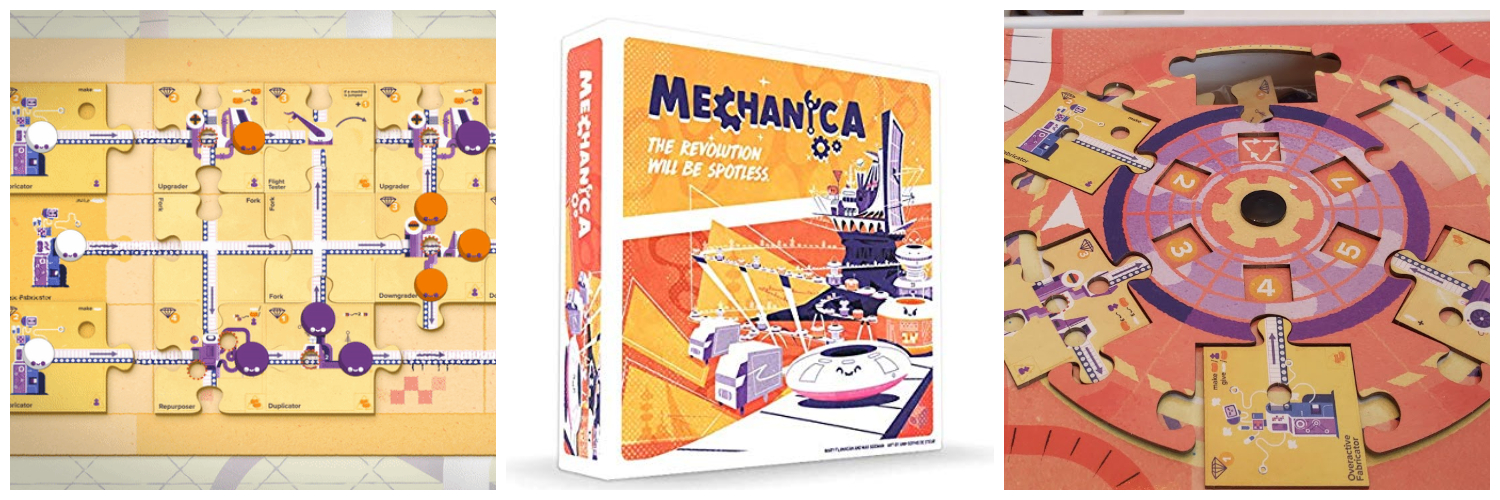
Mechanica by Resonym
Price: ~$45.00 (available for pre-order)
Players: 1 to 4
Playtime: 45 to 75 minutes
Perfect for: Players who enjoy true engine building simulators with an emphasis on efficiency and optimization.
Mechanica is game of vacuum cleaners! Or more pointedly, the construction of various vacuuming robots which can then be sold for profit from the fictional Mechanica Inc. corporation. Players assume the role of an assembly line engineer, choosing the best parts and machines to ensure their operations run smoothly, and the revenue streams are both consistent and bountiful. Before getting into more detail about the mechanics of Mechanica, here’s a quick overview of the theme from the publisher, Resonym:
Mechanica Inc. will make the world spotless with their Tidybots: ambitious vacuum robots made for global DOMINATION cleanliness! Humans are messy. It’s time they got some help!
Build the best Tidybot factory and ship out as many Tidybots as possible to prepare for (the definitely harmless) OPERATION CLEANUP. The player who has sold the most money worth of Tidybots wins!
To begin Mechanica, one to four players retrieve their assembly game board. The board itself is a three by four grid, flanked by spots for “builders” at the beginning of the three assembly lines and trucks and the ends. On a turn, a player performs four steps: 1) sell any constructed robots that are sitting in trucks; 2) buy new parts to upgrade their assembly line; 3) activate the builder robots to begin construction for each assembly line; and 4) reveal a new upgrade available for purchase. Once each player has had the opportunity to take those four actions (if they are able), the round concludes and the robots currently in construction move down their respective assembly line. Gameplay proceeds until all of the upgrade tiles have been revealed. The player who has made the most money over the course of the game is winner.
RELATED: Tabletop Game Review – Unmatched: Battle of Legends, Volume One
What works in Mechanics is the incredibly clever execution of the engine-building theme. The assembly line upgrade components are actually puzzle pieces that are inlaid to the game board after purchase. These upgrades come in many varieties such as duplicating a robot (i.e. 1 goes in, 2 come out), upgrading a robot from cheaper model to a more valuable one, or even simply introducing a “fork” into the assembly lines so robots can move horizontally as well as vertically. The inclusion of these upgrades can result in a wonderfully complex (and satisfying) construction process that yields plenty of money. In addition, players can also upgrade their builders and trucks to handle more input and output capacity. The combinations and assortment of upgrades keep Mechanica very fresh on each playthrough.
Players who prefer more direct competition in their games may not enjoy Mechanica as much as others. The game does offer an element of interaction in that as more upgrade pieces are introduced, previous options become less expensive. This results in a bit of a press-your-luck element in terms of purchasing the upgrades you really want, but not waiting too long for the price to drop whereby making it easier for an opponent to snatch it before you. Furthermore, there are bonus objectives available to players (i.e. selling a particular combination of robots from the trucks might yield a lot more money) and these goals go away once at least one person has fulfilled the requirements within a round. Therefore, keeping an eye on opponents’ board might be prudent. All that said, Mechanica is really about personal optimization more than anything else, so much of the playtime is spent assessing one’s options when their turn comes around.
The other minor “positive” quibble is players might want more! The variety of available upgrades are fun and fairly varied, but Mechanica feels ripe for expansion with new abilities and possibly even robot types. Clearly a lot of effort into the design and execution of this game to ensure that it is balanced (which it is!), so it is really a compliment in saying additional facets would be welcome.
Mechanica is extremely fun to play given the puzzle-pieces aspect. Crafting unique assembly lines is very entertaining, especially when everything operates as intended. In terms of engine-building games, Mechanica runs a little more on the complex side, so it should satisfy more seasoned players.
Recommended if you like: Tsuro, Terra Mystica
Final Grade: A-
Don’t forget to share this post on your Facebook wall and with your Twitter followers! Just hit the buttons on the top of this page.
—–
Have you checked out LRM Online’s official podcast feed yet The LRM Online Podcast Network, which includes our flagship podcast Los Fanboys, our premiere podcast Breaking Geek Radio: The Podcast, and our morning show LRMornings? Check it out by listening below. It’s also available on all your favorite podcast apps!
Subscribe on: Apple Podcasts | Spotify | SoundCloud | Stitcher | Google Play

 FOR FANBOYS, BY FANBOYS
Have you checked out LRM Online’s official podcasts and videos on The Genreverse Podcast Network? Available on YouTube and all your favorite podcast apps, This multimedia empire includes The Daily CoG, Breaking Geek Radio: The Podcast, GeekScholars Movie News, Anime-Versal Review Podcast, and our Star Wars dedicated podcast The Cantina. Check it out by listening on all your favorite podcast apps, or watching on YouTube!
Subscribe on: Apple Podcasts | Spotify | SoundCloud | Stitcher | Google Play
FOR FANBOYS, BY FANBOYS
Have you checked out LRM Online’s official podcasts and videos on The Genreverse Podcast Network? Available on YouTube and all your favorite podcast apps, This multimedia empire includes The Daily CoG, Breaking Geek Radio: The Podcast, GeekScholars Movie News, Anime-Versal Review Podcast, and our Star Wars dedicated podcast The Cantina. Check it out by listening on all your favorite podcast apps, or watching on YouTube!
Subscribe on: Apple Podcasts | Spotify | SoundCloud | Stitcher | Google Play




